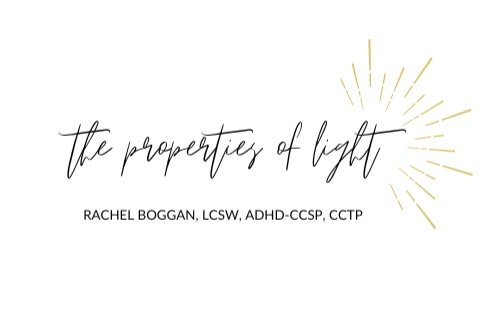"Autism is still widely regarded as a “disorder,” but this view has been challenged in recent years by proponents of the neurodiversity model, which holds that autism and other neurocognitive variants are simply part of the natural spectrum of human biodiversity, like variations in ethnicity or sexual orientation (which have also been pathologized in the past). Ultimately, to describe autism as a disorder represents a value judgment rather than a scientific fact."
- Dr. Nick Walker, Neuroqueer.com
At The Properties of Light, we hold strongly the belief that SELF IDENTIFICATION IS VALID, AND ENOUGH! We also acknowledge that in our current (and flawed) medical model of care, formal identification or diagnosis is often necessary for recognition of physical, cognitive, sensory, communication, and social access and support needs. We desire to build a collaborative, affirming, and accessible path to clinical diagnosis for those who deem formal diagnosis important or necessary for themselves and/or their loved ones. There is a current and urgent need to redefine the ways in which we conceptualize, identify, describe and support neuro-differences that are consistent with a society in which all brains, bodies, and people are inherently valued and respected.
Clinical diagnosticians, service and support providers require conceptual framework and language that is not only accurate and strengths based, but also rejects any inference that these differences are deficits, or the false and harmful implication that the neurodivergent brain is a disordered version of a neurotypical brain. Neurodivergent people have the right to affirming and acceptance based language for use both in their own journey of self-discovery and self-knowledge, and in education and advocacy for their experiences and support needs in a neurotypical world.
This includes using non-pathologizing language in the identification of autism to describe the differences in social communication and interaction, patterns of behaviors and engagement in interests, and sensory experience that are characteristic of this neurotype. This includes using non-pathologizing language to describe and understand the key differences in executive functioning and regulation of attention that characterize adhd.
Additionally, this includes looking beyond a narrow scope of pathologized, stereotyped stress responses observed in neurodivergent individuals as diagnostic criteria, to include a more inclusive, culturally respectful and nuanced understanding of the ways in which neurodivergent people of all backgrounds, races, genders - with a wide variety of strengths and support needs - experience and interact with their world. This includes expanding clinical understanding of trauma-informed care to include sensory trauma and the unique experiences of autistic and otherwise neurodivergent people.
This also includes identifying services, supports and resources that fully affirm, value and validate the experiences, self-determination and intersectional identities of neurodivergent people. This means services, supports and resources that are focused on self-acceptance rather than assimilation to neurotypical "norms" and expectations, equitable access instead of compliance, and inclusion without contingency.
This is the framework with which we approach the collaborative process of formal diagnostic evaluation, self-exploration of neurodivergence and caregiver/family support.
A note on language: we respect the right of all individuals to claim language that is meaningful for their identities. We use identity-first language to describe ourselves, and default to using identity-first language unless/until a person lets us know they use different language to describe themselves.
For more information on affirming language:
The Significance of Semantics: Person-First Language: Why It Matters by Autistic Hoya, Lydia X. Z. Brown
For more information on the Neurodiversity Paradigm & Disability Justice:
Throw Away the Master’s Tools: Liberating Ourselves from the Pathology Paradigm by Dr. Nick Walker
Changing the Framework: Disability Justice by Mia Mingus
For parents, caregivers and loved ones of people newly identified: Autism Moon, by Autistic Typing
For more information about a neurodiversity affirming approach to understanding autism and adhd, and to learn from lived experiences, check out the RESOURCE list!
